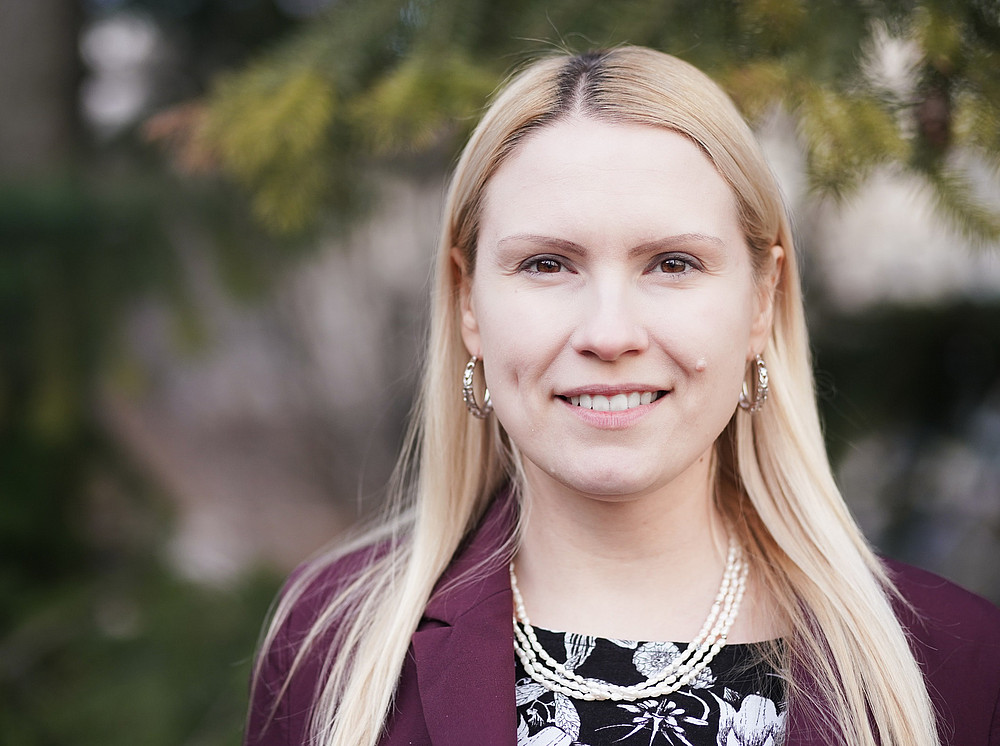Language, culture and everything in between
A detour via physics led Maria Katarzyna Prenner to linguistics. The exciting teaching of a Russian lector triggered the "eureka" moment that awakened her fascination for the subject. Since then, she has not only been passionate about formal and socio-linguistics, but also about exciting, stimulating teaching.
Maria Prenner's habilitation project deals with a highly interesting topic within linguistics. It is dedicated to the development and emergence of the standard or written language in Belarusian in the field of tension between internal and external linguistic factors. This means that Prenner not only wants to know how the language developed, but also why - under what political and cultural conditions.

Language development and culture
The Belarusian territories were subject to different power relations. The territories and the linguistic community are thus characterized as a community of conflict that was exposed to many pull and push factors. Prenner is now investigating these in her research project. Put simply, there is a larger Polish and Russian influence factor and a smaller Ukrainian and Lithuanian one to consider. However, the underlying factor is not just the linguistic act per se, but also the cultural and political interests behind it - this is what gives rise to the particular field of tension in which the Belarusian standard language developed. Prenner's work will therefore not only pursue purely linguistic aspects, but also cultural aspects. This includes a holistic examination of the language corpus - primarily written texts such as newspapers, which also published literary texts, from which cultural aspects can also be read.
Maria Prenner's current research focuses on the areas of morphosyntax-semantics interface, verb semantics, agentivity, language contact, written linguistics and sociolinguistics. Her linguistic focus is, as can be assumed, on Belarusian, but also on Russian, Ukrainian, Czech and Polish, one of the two native languages of the bilingual linguist.
Career paths
Originally, Prenner wanted to study physics, a subject that still fascinates her today, but with a brief stopover in translation studies, she finally found her great passion in linguistics, whose laws sometimes seem as clear to her as those of the natural sciences, which were her first interest. Maria Prenner was the first in her family to complete a Bachelor's degree in Russian and Polish Studies and a Master's degree in General Slavic Studies in Vienna, until her path led her to Cologne, where she finally wrote her dissertation on "Agentivity in Human Impersonal Constructions in Polish and Russian". In Cologne, Prenner also made contact with the Germany-wide network "Verein Erste Generation Promotion", where she found a lot of support for her further career at the university. To this day, Prenner is not only committed to students with exciting, research-led teaching - such as in the lecture "VU Current Research Approaches in Slavic Linguistics", but is also a contact person for students whose academic path is not clearly mapped out. The researcher, who is passionate about linguistics, advises students who are unsure whether they can make it at university due to their family or social background to never give up. To network. Jump over your own shadow and seize opportunities.
Maria Katarzyna Prenner completed her Bachelor's degree in Russian and Polish Studies and her Master's degree in General Slavic Studies (specializing in Russian, Polish, Belarusian and Ukrainian) in Vienna before completing her doctorate in Cologne. After working at the University of Cologne and the University of Giessen, her path led her to the University of Graz in October 2023, where she works as an assistant professor at the Department of Slavic Studies with Boban Arsenijević.
New at university? - Tips for students
For all those who are the first in their family to go to university and/or have a migration background!
Overview of offers at the University of Graz from writing advice to career mentoring.
Get as much out of your studies as possible! - Here you will find tips for every phase of your studies.